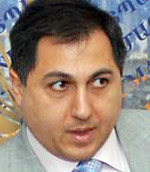– December 10 is celebrated is the day of protection of human rights. What is your assessment of human rights in Armenia particularly in the context of European criteria?
– The European criteria are extensible phenomena and in Armenia there is an incorrect understanding about that. As of the status of human rights in Armenia then I think that we have already registered some positive motives in the aspect of mentality, way of thinking and level of cooperation with the Ombudsman’s institution.
– Does the European Union play any role in the progress taking into account the fact that you are cooperating with the EU.
– It is hard to speak in the percentage ratio but indeed the EU plays certain positive role in the process because integration with the EU (as we are not an EU member) integrates us to European values to a certain extent. In this regard, the activity of the Court of Strasbourg is essential and the EU Eastern Partnership program itself. Europe is more of a cultural and psychological platform. The more we cooperate the more integrated we are. The Ombudsman’s office presently implements two projects with the EU. The first one is implemented in the framework of the OPCAT and the next one is the Twinning. The duration of the OPCAT is 1.5 years, which we have started since the last year and we started the Twinning one month ago. It will be completed in a year and a half. The Twinning is being financed by the EU and there will be a group of EU experts and they will be doing the same thing as my advisors. This is useful because of the human resource aspect because we always need such resources. And by having such a field of experts I already have the opportunity to be more inclusive.
– What do you think, will these projects enable to obtain essential achievements in the sphere of human rights or you think that there can be no crucial progress until contents changes take place in the country?
– The situation will remain unchanged or will change very slowly until contents changes are registered in the country. It will probably take 200 years to reach the average level. It means that no matter what the actual change depends on us. But we change as well by communicating with certain countries in the framework of these programs. By the way, the European values do not lead us to the loss of traditional values. All the nations become a member of a common family and meanwhile retain their national specifics. And here the point is the protection of elementary human rights so that every citizen feels safe to live in the society. And people start to develop based in the culture of behavior. Thus this cooperation is very important for the increase of our political culture.
– You have said that the Ombudsman’s office is implementing two programs with th support of the EU. What have been the results so far? And can our society ever become European?
– Indeed we can. If we were much more European in Kilikia back centuries ago then we definitely can now. We have lived in an opposite cultural field. That is the reason why we are like this now. As of the fixed results than if the OPCAT program wasn’t there we wouldn’t be able to work efficiently in this direction. This year on December 10 we will present our first national report as a mechanism and if the EU hadn’t helped us we wouldn’t be simply unable to do that because we had no resources. We didn’t have the people to permanently visit penitentiaries and monitor the situation there.
– Will you specify what exactly they are doing and in what format they work?
– The EU hires experts, funds them and they resolve issues set by us. Same is with the Twinning program. For example, we are anticipating making some changes in our law and the EU experts are currently examining the legislative field of our country. At present, the expertise groups of France and Spain are currently working with us. They are surveying the international experience so that we include changes I our law. They will be I our office for one and a half years and I can give them any assignments during this period. They have the status of my advisors. If the state gives us only three advisors then today I have six because three of them are from the EU.
– Perhaps the most complicated structure in terms of human rights in Armenia remains the judicial system, which despite the reforms of the recent years is nevertheless too far from being independent. To what extent can the integration of Europe resolve this issue?
– The Court of Strasbourg already makes us take the steps of the reforms because it is not desirable for the state to go there and lose both morally and financially. Therefore, we base our conclusions by comparing to what extent the verdict of an Armenian court conforms to the standards or approximate verdicts of the Court of Strasbourg. The Court of Cassation of Armenia by cooperating with a number of international organizations prints a collection of verdicts, which should serve as a guidebook and precedent for the first instance courts and the judicial system in general. This is a direct help from the EU. And this gives certain results. There is certain progress and we should admit that the cooperation with the EU helps a lot.

